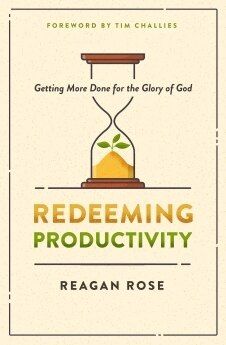Redeeming Productivity

I’m a sucker for a certain kind of book: one that’s practical, but deeply rooted in God’s truth.
Some books are practical but lack depth. They tell you what to do without grounding their advice in anything deeper. Other books are deeply theological but don’t tell you how to live. My favorite books begin with God’s truth, and then tease out what that truth means for our lives.
One such book is Redeeming Productivity: Getting More Done for the Glory of God by Reagan Rose.

Theological Truths
Rose bases his book on five theological truths:
- You belong to God.
- You exist to glorify God.
- You were saved to bear fruit for God.
- You are uniquely gifted by God.
- You will give an account to God.
Rose calls these pillars: a “foundation for thinking biblically about work and efficiency.” In order, they describe the origin, purpose, content, power, and motivation for being productive. “Only when we have our theological foundation right can we start to build productive practices that truly honor God,” he writes.
These pillars ground us in rich theological truth. Not only that, but they’re all focused on God. The place to begin in thinking about productivity is not our to-do lists or our quest for personal productivity; it’s in thinking well about God and his purposes. I really appreciate that Rose begins with these foundational truths before getting practical.
Five Productivity Habits
From these foundational truths, Rose develops what he believes to be the five most effective productivity habits:
- Craft your morning routine.
- Get organized.
- Track your commitments.
- Set your goals.
- Write your well done.
I’ve benefited quite a bit from what Rose has taught, and these chapters are characteristically practical. Rose doesn’t promise too much: this book is not one that overpromises. But anyone who implements these steps will be better equipped to do the work God has called them to do.
Others have written about the danger of productivity books. In Four Thousand Weeks, Oliver Burkeman, a self-described productivity geek, describes his frustration with his quest for greater productivity. “Using these techniques often made me feel as if I were on the verge of ushering in a golden era of calm, undistracted productivity and meaningful activity. But it never arrived. Instead, I just got more stressed and unhappy.” Burkeman’s not alone. I can’t wait to read Jen Pollock Michel’s In Good Time: 8 Habits for Reimagining Productivity, Resisting Hurry, and Practicing Peace, which promises to “disentangle your priorities from our modern assumptions about productivity.”
In other words, be careful about productivity books. They may do more harm than good. But I believe that Redeeming Productivity is a book that isn’t focused on an unhelpful vision of productivity. Rose writes:
You are going to fail. You are going to overcommit, you’re going to break promises, you’re going to fail to meet your goals, you’re going to waste time, you’re going to procrastinate, you’re going to have unfinished to-do lists, and you will end many days feeling entirely unproductive. And that’s okay for two reasons…
Rose reminds us of our limits as creatures, and of the grace of God. His focus is not on an illusive version of our best life; it’s about a lifelong quest to live for the glory of our great God.
I appreciate this book. If you, too, like rich theological truth applied to life, I think you’ll like it too. And it may just help you improve how you live your life, with all its complexities and demands, for God’s glory.
More from Amazon.com





